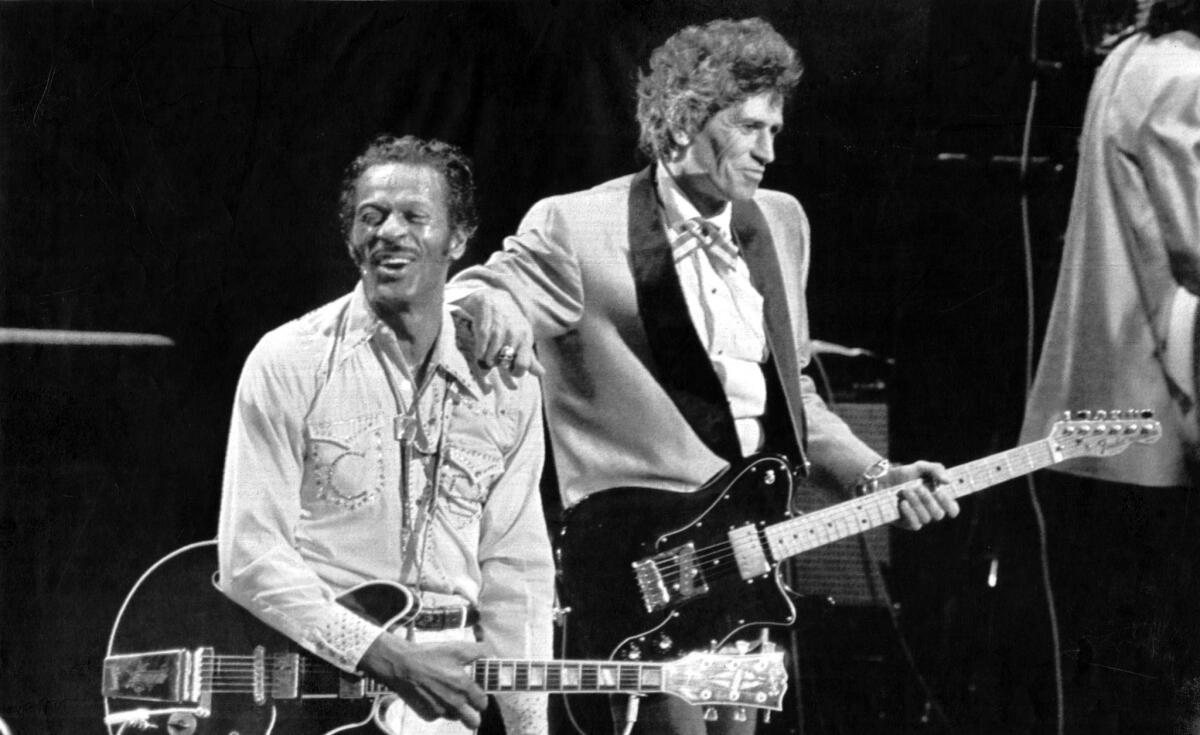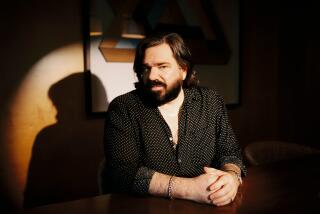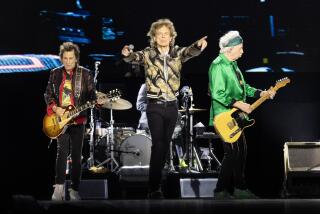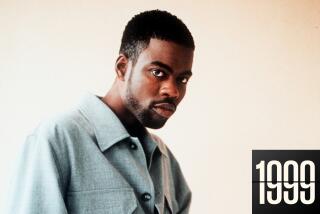From the Archives: The time Chuck Berry and Keith Richards clashed onstage: ‘You’re going to have to let me lead’

Reporting from St. Louis — Chuck Berry, a founding father of rock ’n’ roll, died Saturday in his native St. Louis at the age of 90. But in 1986, on the occasion of his 60th birthday — 31 years after the release of Berry’s signature hit “Maybellene” — then-Times pop music critic Robert Hilburn witnessed an onstage clash during a rehearsal and concert in St. Louis between two rock legends: Berry and the Rolling Stones’ Keith Richards.
Film director Taylor Hackford was filming the concert for his documentary on Berry, “Hail, Hail Rock ‘n’ Roll.” Hilburn’s account is a fascinating glimpse into the way two of music’s strongest personalities at first resisted each others’ working style but eventually found their groove and put on a show.
This piece from the archives was originally published on Oct. 18, 1986.
---------------
Roll over Beethoven, again.
Chuck Berry, the man whose songs in the ‘50s about school days and sweet 16 defined many of rock’s youthful themes, turns 60 today.
Yes, nostalgia fans, it was 31 years ago that Berry’s first hit, “Maybellene,” was released.
Berry marks the occasion with a concert tonight in New York. But the real celebration was held here Thursday night at the old, ornate, 4,500-seat Fox Theatre. The party mood was darkened, however, by a conflict between Berry and one of the more famed guests — the Rolling Stones’ Keith Richards.
The two shows were staged in connection with a documentary film of Berry being made by director Taylor Hackford, whose credits include “An Officer and a Gentleman” and “White Nights.”
The $2.5-million film, titled “Hail, Hail Rock ‘n’ Roll,” is scheduled for release next summer by Delilah Films in association with Universal Pictures and MCA Home Entertainment.
For the occasion, Berry, who normally works with unrehearsed pick-up bands when touring, was joined by an all-star cast, most notably Richards, whose music represents the clearest and most dramatic extension of Berry’s flavorful, ringing guitar style. Others included Eric Clapton, Linda Ronstadt, Julian Lennon, Etta James, Robert Cray and Berry’s longtime piano sidekick Johnny Johnson. Bob Dylan was scheduled to appear but canceled because of illness.
And the show was memorable — but not always in the expected ways. The concerts were supposed to start at 6:45 and 9:45, but technical problems delayed the start of the first show till 7:30 at night and the second one till 12:30 a.m. An exhausted Berry finally left the stage at 2:30 in the morning.
For all the drama surrounding it, the opening show was a disheartening and tiring affair.
There was a constant series of interruptions, tied mainly to the film making. But the shows also saw the culmination of the tension and frustration that had reportedly surfaced between Berry and Richards during several days of rehearsal here. Keith Richards may have championed and advanced Chuck Berry’s sound, but Berry still wanted to be in charge.
At a rehearsal open to the press Wednesday night at the Fox, Berry, who seemed content to let Richards and the band set the tempo when other artists were singing Berry’s songs, appeared annoyed when Richards continued that leadership role when Berry was singing the songs.
“You’re gonna have to let me lead on the songs I sing,” he snapped. To Richards’ response he added, “I’m responsible for how they go over.” Before the song was finished Richards put down his guitar and left the stage until the end of the song.
While nothing as dramatic happened during the first show Thursday, the musicians did sometimes seem to be operating at cross purposes, and Berry and the band never seemed to quite settle into a groove.
Backstage between shows the anxiety level was high as Richards, Berry and Hackford met behind closed doors to salvage what the director later described as “a disaster in a way.”
Many of the technical and personal problems were apparently resolved, because the second show was smoother, and Berry left most of the guitar playing and tempo-setting to Richards. He concentrated on vocals, and though his voice was hoarse, he was a much more effective performer.
When you deal with Chuck there is conflict . . . He has a way of doing things only his way. And Keith is also a very strong personality . . .
— Taylor Hackford, director
In contrast to the hundreds of walkouts near the end of the first show, the audience for the late program was there to the end – and was on its feet for most of the closing numbers. Though there were still delays, Berry and company played with fewer interruptions, establishing a momentum and energy that never quite materialized during the opening set. The colorful finale featured Berry being driven on stage in a red Cadillac convertible while he sang “School Days,” his Top 10 tune from 1957.
Berry and Richards embraced frequently during the second show, but neither appeared eager afterward to discuss the evening with reporters.
Berry did meet with reporters briefly at the cake-cutting ceremony in the Fox lobby. Asked about the differences between the two shows, he said, “It’s not for me to comment on the shows. ... It’s for the critics ... My opinion doesn’t matter.”
Richards headed straight for his limo to go back to his hotel. Asked as he was getting into the car about why he wanted to take part in Berry’s documentary, he said simply, “Repaying some dues.” When asked how he felt at the end of the first show, he said sharply, “I could have killed him.” Richards wasn’t smiling, though an aide said later that he was simply being colorful in expressing his frustration and that he still greatly admired Berry.
That left an exhausted Hackford to try to put everything into perspective.
Standing in a tiny backstage production room, the bearded director said, “When you deal with Chuck there is conflict and tension. He has a way of doing things only his way. And Keith is also a very strong personality, and he’s a band leader. ... This is a labor of love for both of us and (an attempt) to try to capture some of the magic that we know Chuck has. ...
“My sense was not to create a kind of glossy commercial-like movie that had all these kind of nice angles and stuff, but ... to try to capture some of the brilliance of this man and at the same time the difficulty of this man. And it’s all going to be there.”
See the most-read stories in Entertainment this hour »
ALSO
From the Archives: Chuck Berry talks music, race and his ‘difficult’ reputation
From the Archives: 10 Chuck Berry songs that inspired the rest of rock ‘n’ roll
From the Archives: How Chuck Berry managed to look and sound so good even in his later years
More to Read
The biggest entertainment stories
Get our big stories about Hollywood, film, television, music, arts, culture and more right in your inbox as soon as they publish.
You may occasionally receive promotional content from the Los Angeles Times.










